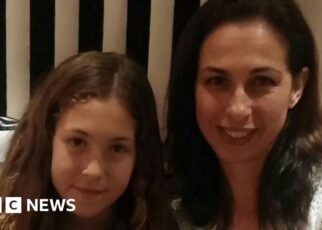[ad_1]
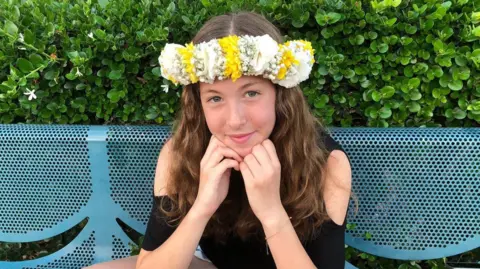 Family handout
Family handoutAyelet Levy Shachar turned down an invitation to get on Benjamin Netanyahu’s plane to Washington. Her daughter, Naama Levy, was kidnapped by Hamas gunmen from an Israeli army observation post near the Gaza border on 7 October.
It was not a political decision, she told me, saying she’d been “honoured” to be asked by the Israeli prime minister, but the timing was wrong.
Ayelet’s face lights up when she talks about Naama, who turned 20 years old in captivity, describing her as a determined and fun-loving young woman, a good student and athlete.
She’s hopeful her nine-month nightmare might be coming to an end.
“We have heard from defence and security forces that they’re reaching the point of breaking a deal,” she says. “And we have never before been in such a promising point at that sense.”
“Nothing should be distracting [us] at this point… this is what we should be dealing with right now. I’m asking and hoping that our prime minister’s commitment to this will be his first priority.”
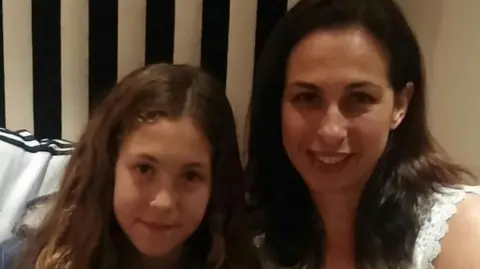 Family handout
Family handoutSome relatives of men and women still held captive in Gaza did travel to Washington with the Israeli prime minister. They were joined by Noa Argamani, the 26-year-old woman who was rescued by Israeli forces in June.
It was a controversial decision, as those campaigning for the hostage release deal had been holding protests urging Mr Netanyahu not to go before bringing their loved ones home.
When the Israeli prime minister arrived in the US on Monday, he told families of the hostages that an agreement could be nearing, but that military pressure on Hamas must continue.
“We see that the enemy’s spirit is starting to break,” he said at the first meeting of his visit. “I believe if we are steadfast in this, we can achieve a deal.”
“I am not prepared in any way to give in on the victory over Hamas.”
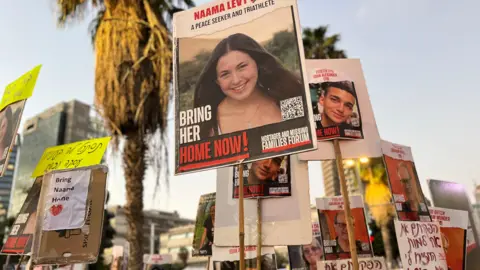
Israel launched a campaign in Gaza to destroy Hamas in response to the attack on southern Israel last October, during which about 1,200 people were killed and 251 others were taken hostage.
More than 39,000 people have been killed in Gaza since then, according to the territory’s health ministry.
Mr Netanyahu has been resisting pressure to accept a proposed ceasefire deal that would allow an exchange of the remaining 116 hostages, 44 of whom are believed to be dead, for Palestinian prisoners.
Israel’s security establishment has been signalling that an agreement is possible since Hamas recently dropped its demand for an upfront guarantee of a permanent ceasefire.
According to Israeli media reports and BBC sources close to the indirect talks, the negotiations have since bogged down again on Israeli demands that soldiers maintain supervision of corridors along the Egyptian border and in the centre of Gaza, in particular on Mr Netanyahu’s insistence for a mechanism to prevent armed fighters from returning to the northern part of the strip.
“Now is the money time,” Col Lior Lotan, a close adviser to Defence Minister Yoav Gallant, told Israel’s Channel 12 News on Friday.
“The terms of the deal includes risks that the defence establishment can tolerate… All the heads of the security services say this. To counter them with a hypothetical, as if it were possible to get more through more military pressure, would be wrong.”
Warning: Some readers may find the image below disturbing.
This week, Israel confirmed that two more of the hostages had died in captivity several months ago, one of them possibly killed by Israeli military fire – a reminder of the cost of delaying a deal.
Ayelet told us that Naama had arrived at the observation post just two days before the Hamas attack on Israel last year, after completing her basic training.
“I don’t think she knew where the safe room was,” her mother said.
She did find it and sent a message from there, the last her family heard before a video surfaced showing her with tied hands and bloodied sweatpants being forced into the back of a jeep.
Last week, the families of the five female soldiers kidnapped from the observation post published photos of them in their early days of captivity, to remind the world about their daughters’ fate.
These were screenshots taken from a Hamas video retrieved by the Israeli army during operations in Gaza. One photo shows four of the young women sitting on mattresses, some of them with bandages. Naama is not among them.
She is not being held with the others, said Ayelet. There is an image of her with one of her eyes discoloured and swollen shut.
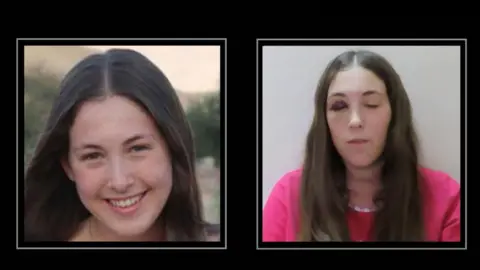 Families Forum
Families ForumBased on information from hostages released during a previous ceasefire and exchange deal in November, Naama’s family understand that her captors moved her from place to place to avoid Israeli military action, and that she had shrapnel injuries in her legs, but was able to walk.
They’ve been told by Israeli security forces since then there is “proof of life” without being given details. The latest information they have is that she’s being held in Hamas tunnels.
Mr Netanyahu is sending the Israeli negotiating team to Doha on Thursday to continue the talks. The process keeps Ayelet’s hope alive, mixed with desperation as a resolution remains elusive.
“Both sides are coming closer with their demands,” she says. “Even saying that it sounds wrong to me, because how can you be talking about demands when you’re talking about my daughter’s life? We are over nine months so I’m actually feeling desperate. It has to happen. It has to happen.”
Thinking about her daughter helps give her strength to cope with the grinding fear and uncertainty.
“I wake up in the morning and she’s still there. I count the days, I count the minutes. How can I stop?” she says.
“I think she’s very strong. And maybe I’m, you know, focusing on that, on that belief that she’s very strong and determined, and smart. And she can survive this.”
[ad_2]
Source link freeslots dinogame telegram营销
